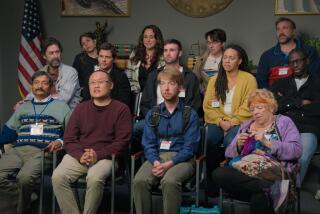Jury Duty Is One of the Prices We Pay for Justice
- Share via
Suppose you work for yourself or as a member of a small firm. You receive a jury notice. What do you do? Under the new juror system in Los Angeles County, self-employment is no longer sufficient cause to be excused. The summons states that “your failure to respond ... will result in an order to show cause ... before a judicial officer.” Penalties may include “a possible fine of up to $1,500.”
So if you call in and discover your group is required to appear the next day, you show up, right? Well, not necessarily.
Welcome to the world of the Selective Citizen: a person who expects the benefits of a civil society but is simply far too busy to uphold them.
I’m a self-employed copywriter with a fledgling business who recently spent a tense week as a juror in Los Angeles Superior Court. I’d have to work at night and fit hurried phone consultations into the court’s daily schedule. Meetings might need to be postponed indefinitely, derailing projects and alienating clients. Then there was the uncertainty of jury service: Would I be picked? How long would the trial last? It was impossible to plan ahead. When the show depends on you and you’re not available, the checks stop coming in.
Anxious as I was, I saw no alternative. So I began alerting my well-heeled clients that I might be hard to reach during the next week. And that’s when I discovered Selective Citizens’ dirty little secret: They routinely throw their juror notices in the trash and pride themselves on never having been caught.
The excuses are fascinating. “I’m so opinionated that no lawyers want me on a jury,” one woman said. She said she used to show up for service but was always dismissed, “so I just don’t bother anymore.” Others said they were too busy. Several people claimed that because a jury summons was sent via regular mail, you could always say you never received it.
One of the court employees who spoke to us jurors said the new rules were designed in part to ensure representation by a full cross section of society. Supposedly everybody over age 18 who receives a notice and is a U.S. citizen, resident of Los Angeles County and unable to claim extreme financial hardship must report for service.
Yet it struck me that very few of my fellow potential jurors appeared to be high-achieving professionals. While I sat in the jury box, preparing to answer the routine questions, I listened to a speech delivered by the potential juror next to me. He was a businessman, he said. The man told the judge that he believed the police adhered to a higher standard of truth, so he would always be inclined to put more credence in an officer’s word than a mere citizen’s. His hands trembled slightly. Finally, he was excused. As he rose, his formerly impassive face crumpled into a smirk.
Had he fabricated an extreme point of view just to be dismissed? If you’re an unwilling juror, it is incredibly tempting to say something, anything, that will bring you freedom. I tried to think of arguments that would get me excused. But nothing plausible came to mind. Having served on several civil and criminal juries, I knew I was perfectly capable of rendering a judgment “fairly and impartially
The fact is, what I was being asked to do was not unfair. It was simply the price of being a member of a society that allows someone’s alleged wrongdoing to be judged by a group of ordinary people. And if I had to be there, so should everyone else on the food chain.
Selective Citizens never know when they might need a jury of their peers. And what a pity if none of their kind bothers to show up.
More to Read
Inside the business of entertainment
The Wide Shot brings you news, analysis and insights on everything from streaming wars to production — and what it all means for the future.
You may occasionally receive promotional content from the Los Angeles Times.










